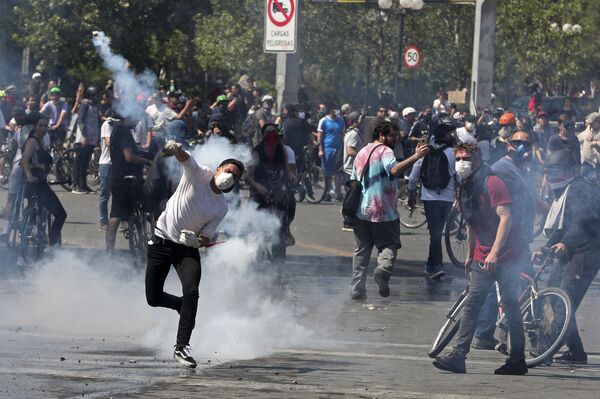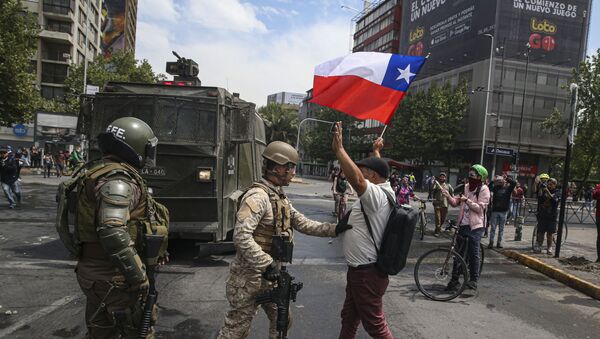The 2019 Chilean protests that have riled the nation since 14 October have taken their toll on the country's economy, sending the peso lower and prompting the government to announce that it would sell up to $20 billion in foreign currency interventions starting on 2 December and lasting through 29 May 2020.
Earlier this year, Chilean President Sebastian Pinera, a conservative billionaire who served his first term as the country's president in 2010 to 2014, highlighted the strength of the Chilean economy, stressing that "investment and productivity have become an engine stimulating growth". However, a 30 pesos ($0.04) hike in the Santiago Metro's subway fare has unexpectedly become the last straw triggering longstanding mass protests. So, what went wrong?
Implosion of Chilean Economic Model
According to Gustavo Guerreiro, executive editor of the journal World Tensions and a member of the Brazilian Centre for Solidarity with Peoples and Fight for Peace (CEBRAPAZ), the problem actually stems from the package of neo-liberal reforms implemented by Augusto Pinochet, a Chilean dictator who ruled between 1973 and 1990.
"Pinochet understood nothing about economics," Guerreiro elaborates. "Chile liberalised the economy and privatised the public sector, which rled to strong economic growth and low inflation. The problem is that such measures have not translated into the welfare of the population and have been accompanied by high levels of inequality and precarious labour legislation, combined with a dismantling of the public sector, especially in the areas of health and education."
The researcher explains that despite having one of the highest per capita incomes in Latin America, the country's wages "do not account for the high cost of living", with the fully privatised social security system being "one of the major problems".
"The average income pattern of the Chilean people still disguises brutal inequalities in their distribution, which are among the highest in the world," he says. "What we are seeing now is the implosion of a model that, from its inception, already announced the tragedy."
Indeed, Chile tops the South American list of yearly per capita incomes, suggesting that Chileans make over $2,000 a month. However, in reality, half of Chilean workers earn $550 a month or less, according to the National Statistics Institute.
On the other hand, the income of the richest Chileans is about 13.6 times higher than that of the poorest. Chile has an income gap 65 percent wider than the Organisation for Economic Co-operation and Development (OECD) average.

New Constitution Doesn't Necessarily Mean Social & Economic Changes People Demand
The ongoing unrest has forced the country's authorities to speed up the discussion of a new constitution 30 years after the end of the Pinochet dictatorship. Chilean Senate President Jaime Quintana said the new Constitution would "build a true social contract" and be "100 percent democratic" compared to the current code, which was approved during the rule of Augusto Pinochet.
It is expected that the country will hold a referendum in April 2020 on whether to rewrite the constitution and how.
"Although it is an important step, I do not believe that the promise of a new constituent assembly will be sufficient to contain the protests", Guerreiro presumes referring to the public calls for the government's resignation. "In addition, opposition parties have filed with the Chilean National Congress a constitutional accusation aimed at ousting President Sebastian Pinera, who has been cornered by the protests."
According to the scholar, the much-discussed constitutional reform "does not necessarily address the social and economic changes claimed by the people". Therefore, the protests have continued, despite the government vowing in mid-November to reconsider the constitution, he remarks.
"In my view, the protests continue because there is no objective signalling about what changes will take place in the constitution, which has undergone several amendments since 1980," Guerreiro says. "There are quite controversial points, such as Article 16, which does not allow public servants to strike, and Article 19, which practically removes responsibility for social services from the state. I do not see how protests can diminish without constitutional reform pointing to a greater protection of social rights and increased popular participation in decision-making".
How Chilean Unrest is Affecting Brazil & Argentina
According to the researcher, the ongoing turmoil in Chile is having an impact on its neighbours. For instance, in Brazil, it prompted the president's son, Eduardo Bolsonaro, now a politician and a federal police officer, and the economy minister Paulo Guedes to hint about the return of Institutional Act 5 (AI-5), he notes. The measure, which was used by the Brazilian military government between 1964 and 1985, permitted the shutting down of Congress, censorship and torture.
"Don't be startled then if someone asks for an AI-5," Guedes said during his 26 November trip to Washington, sparking a firestorm of criticism in social media.
However, Guerreiro points out that at the same time "the Brazilian government has retreated from advancing neo-liberal fiscal tightening reforms that can deepen inequality and leave the country in the same situation as the Andean country."
The researcher believes that to some extent the Chilean unrest influenced the October general election in Argentina, which saw the defeat of Mauricio Macri, who used to implement neo-liberal policies, and resulted in the win of centre-left politician Alberto Fernandez
"So far, the influence of Chilean instability has been much more political, which explains the unpopularity of the Washington Consensus agenda in South America," Guerreiro concludes.


